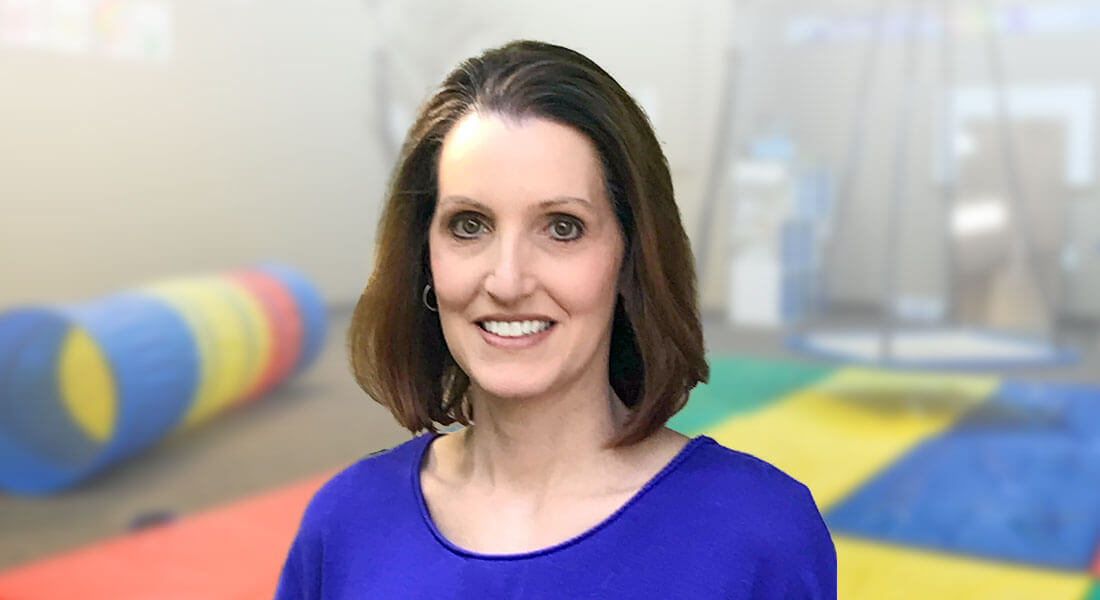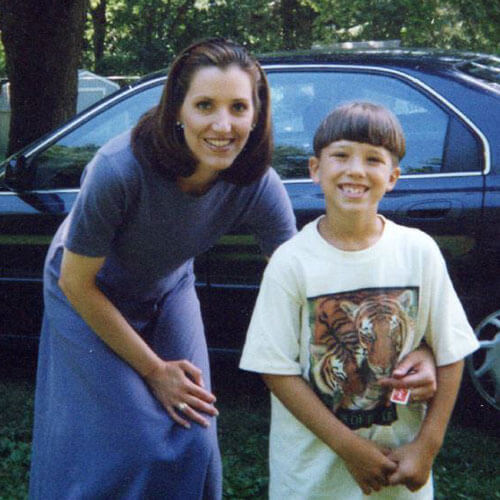Dr. Ann’s Corner:
A Peek into the Life of a Parent and Professional in the Autism Community
May 30, 2018
May 30, 2018

If you are a parent of a child with autism, you feel the pain watching your kiddo struggle through challenging moments, the toll of added time and resources, and uncertainty about the future. What others outside the autism community may not see, though, is you also feel the beauty of watching your child overcome those same challenging moments, and you discover a newfound inspiration for your own life.
Hopebridge Licensed Clinical Psychologist Ann M. Hetzel, Ph.D., has a son, Dan, on the spectrum and knows this first-hand. Originally working as a band director, her son’s battle was her motivation to unearth new skills and ultimately transition into a new profession. Now in his late 20s, Dan is a Temple University graduate who works for an east coast publishing company, writes film reviews for a popular local website, and reads a voluminous amount of classic literature and French philosophy in his spare time. While still not without challenges, in order to bring him to this full potential, she had to take things into her own hands.
Good mental health services were not easily available in Ohio when he was younger. At the time, she felt it necessary to continue her education.
“We needed someone to understand Dan and what he was going through,” said Dr. Hetzel. “It was my philosophy that I did not have the challenges he did, and as the adult, I would be ok, so I needed to put in the time for him. It was important our family made sacrifices to meet his needs, serve as his advocate and maximize his care.”
She went on to earn her master’s degree in mental health counseling from Kent State University and her doctorate in clinical psychology from Capella University. Years after helping her own son, she spends her time conducting one-on-one diagnostic assessments in line with the Autism Diagnostic Observation Schedule, Second Edition (ADOS-2), for other children at Hopebridge. Her role is to evaluate the communication, social interaction, play and restricted and repetitive behaviors for individuals who have been referred by physicians, schools or caregivers due to possible autism spectrum disorder (ASD).
Knowledge and assistance surrounding autism and other developmental disorders was not as readily accessible in the 90s, but Dr. Hetzel knew that some of Dan’s sensitivities and other behaviors were different than those of his peers, even at an early age.
Dan startled at loud sounds, for instance. While that is common for babies, the response to all types of noises continued for Dan as he grew older. He also had strong sensitivities to certain clothing, tags, textures and food. There is one particular instance that sticks out for Dr. Hetzel, which still makes her smile to this day.
“I remember there was one pair of somewhat expensive Stride Rite shoes we bought for Dan as a toddler. One of them went missing after he wore them only a couple times, and I was upset because we spent all that money on those shoes. Eight years later, while packing to move out of state, I found it at the bottom of a random clothing drawer! I laughed so hard and went to show Dan’s father.

“Neither of us put it there, and of course neither did the cat, so we knew Dan hid it because he didn’t want to wear it. I respected that. I was never the type of parent who forced things. I took out tags from t-shirts and didn’t make him wear the shoes. I listened and followed his lead. Even before the diagnosis, I knew there had to be a reason why he had these preferences and discomforts,” said Dr. Hetzel.
Those were some of the early signs of autism, and then, around ages 4 and 5, Dan displayed some social differences. During a bowling outing with his daycare, he chose the end lane far from everyone else. He couldn’t be in the midst of cheering and the sound of pins knocking against each other. He would also give himself breaks at birthday parties and other social gatherings.
“Once at a friend’s house, I remember he opened the front door, walked out, closed the door and sat on the porch for a few minutes. I watched from the window, and when he was ready, he came back inside. It sparked something in me because I didn’t witness a lot of other kids doing this, nor did they seem to have a need to do it,” she said. “I mourned for him a little as far as the social aspect, but that’s who he was and who he remains to be to this day.”
Dr. Hetzel knew Dan had differences, but a family friend brought a new light to them. She was a school psychologist who helped open the Asperger’s conversation. From there, Dr. Hetzel went back to school to learn more about mental health.
Dan didn’t have the official diagnosis until he was around 8 years old, although his mother already knew the answer. Up until that point, he had wonderful teachers willing to work with him. His third grade teacher unfortunately exposed the discrimination from some individuals who may not fully grasp autism or differences in others. She told Dr. Hetzel he was “never going to be anybody,” at which point she felt a diagnosis was crucial.
Watch: How is Autism Diagnosed
A neurologist at Rainbow Babies and Children’s Hospital in Cleveland provided the Asperger syndrome diagnosis (in addition to his prior diagnosis of ADHD; a commonly comorbid condition with ASD), while also noting his intelligence, which helped negate the former teacher’s words.
This was reassuring, but also opened another door… “now what?”
Because autism-related services were limited, Dr. Hetzel continuously drove two hours to Cleveland to make sure her son received quality occupational therapy. Services he received focused on his sensitivities to textures and food. He began a sound program with special CDs, plus a personalized “sensory diet.”
The family noticed improvements, but when Dan was 10 years old and Dr. Hetzel was already in graduate school, his father took a new out-of-state job. They decided to look further to get access to even stronger schools and services. This led them to Philadelphia.
The change of pace proved to work well for Dan. The school system provided an assistant and extended school-year program (ESY) to continue to acquire skills throughout the summer. He made straight As and was granted funding for a camp for the gifted during middle school, which worked wonders for his social skills. This set him on a trajectory so in high school he did not need the same assistance.
“I kept saying, ‘if you give him more help now, he’ll need very little in high school,’ and that’s exactly what happened,” said Dr. Hetzel. “This is one of the reasons I now stress the importance of early intervention. Imagine what it would be like for someone to have that kind of assistance at an even younger age.”
Philadelphia is also where Dan found karate. He earned his black belt in two years, taught younger kids and was viewed as an expert in the practice. It helped him develop who he was and a sense of independence, which his mother thinks was the best thing to ever happen to him.
In Pennsylvania, individuals on the autism spectrum are also provided the opportunity for weekly in-home mental health therapy.
“It was here that he learned that different doesn’t have to be ‘less than.’ Different is just different. We were so fortunate to have some incredible therapists work with him, and I believe it was significant to his overall well-being and success,” said Dr. Hetzel.
Years later, Dr. Hetzel remains dedicated to her son and her work, which assists others in similar situations to where her own family started.
“Don’t hesitate to have your child evaluated and learn as much as you can about ASD. Receiving the right diagnosis and getting the right therapy are two of the most important things that can change lives for the better,” she urges parents.
Want to learn more from Dr. Hetzel’s personal and professional expertise? Follow her monthly series, “Dr. Ann’s Corner,” here on the blog to read about everything from cyclical grieving to what the diagnostic process is really like.
*Informed consent was obtained from the participants in this article. This information should not be captured and reused without express permission from Hopebridge, LLC. Testimonials are solicited as part of an open casting call process for testimonials from former client caregivers. Hopebridge does not permit clinical employees to solicit or use testimonials about therapeutic services received from current clients (Ethics Code for Behavior Analysts 5.07-5.08; BACB, 2020). Hopebridge does not provide any incentives, compensation, or renumeration for testimonials provided by a former client or client caregiver.
Team Spotlight
December 02, 2020
Autism Therapy Providers and Families Benefit from Grand Rounds at Hopebridge
Autism Therapy
September 30, 2018
What Does Center-Based Therapy Look Like? Learn from a Hopebridge BCBA
Team Spotlight
October 31, 2025
Two Decades Strong: Stories from the Heart of Hopebridge Autism Therapy Centers
Team Spotlight
November 20, 2023
Hopebridge Florida Spotlight: Center Leadership and Clinicians Make an Impact Through Pediatric Therapy